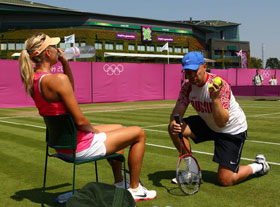Special Feature
Talking with Michael Joyce - Part 2
by
Colette Lewis, 28 February 2015
| Share: |  |
|  | |
|
|
Colette Lewis of ZooTennis.com got the chance to talk with former tennis player and now coach Michael Joyce earlier this month in Midland, Michigan at the $100,000 Dow Corning Tennis Classic. We printed the first part of their conversation yesterday in this article.
Today we see the rest of their conversation.
Questions and Answers
Colette Lewis (CL): What's your opinion on the decline of American tennis, especially on the men's side?

Joyce worked with Maria Sharapova for a number of years
courtesy
Clive Brunskill, Getty Images
Michael Joyce (MJ): I think part of the problem is if you look at tennis in general, it's so much bigger in other countries. You go to Europe, even Asia now, and tennis is right up there. In the US, we have so many other sports, the really good athletes are playing other sports. To be honest with you, if I had a daughter, if she wanted to play tennis, I would do everything I could to help her. But if I had a son...
At 50 in the world, I was probably the eighth best American. If I was that in baseball or basketball, I'd be a multimillionaire. That's the main reason.
A lot of people like to blame the USTA. I think that's silly. I think the USTA does a great job of helping when they can, but they've never really developed a player. The years of Sampras and Agassi, Courier and Chang, nobody was complaining about the USTA then, and they were doing the same thing that they are now. I think they've done a really good job with these girls who are now top hundred. They came up together, they work together, but you can't expect a system like that to produce a champion, because they really never have.
It's not a knock on them. But to do that you need the personal attention, continuity day in and day out. I'm sure in the next five years, we'll start to see some guys breaking through, and it probably won't even be an issue anymore.
Developing a champion starts at nine, ten years old. You're not going to make a champion, when you get them at 16 or 17. It starts very young and I don't think it's possible starting at 8 or 9 and you're in a system where you're seeing different coaches and hearing different voices and all of a sudden you're going to be great. It's never happened and I don't think it ever will.
CL: Who was the biggest influence on your coaching style and philosophy?
MJ: Lansdorp taught me how to hit the ball, he was my coach growing up. However, I only took one hour or two hours a week my whole life, so my biggest mentor and who helped me the most was my dad.
He would go to my lessons, see what I was working on and do it three hours a day. Take out the ball machine. So whatever Robert was teaching me, my dad was putting in my mind for another 30 hours of the week. Maria's dad didn't really know how to play tennis, but he knew how to feed balls and stuff, so she would take a lesson and he would take her out those other two hours and work on it. So you constantly have that in your mind.
That's where I think a lot of kids are missing, because they take a lesson, then they go to another coach, and the parents have money and they want to do this. But what's the most important is the repetition, when you're young. My dad was a director of photography, so I remember at a very young age he was into strategy and knowing my opponent, knowing how to change during a match. Even at 8, 9 years old, he was giving me game plans. Or when I was done playing a match, asking me the kid's weakness, making me write it down, so if I played the kid again, I knew what to do.
I never went into a match unprepared. It was a little bit annoying at the time, but I think that stuck with me. I was never the biggest kid, but I had a successful junior career and won a lot of matches because I was tougher and smarter. And I think he put a lot of that in my mind, so I see the game probably a little bit differently than most people.
A lot of coaches say you don't need to worry about your opponent, just play your game. To me that's stupid. Of course you want to play your game, but you have to be smart about what you're doing, when there are certain things that you can control. My dad, especially now that he's gone, I look back and think a lot of why I've been successful is because of the mindset he gave me.
Jose Higueras helped me a lot. When I was 18, 19 and turned pro, I started to go to Palm Springs and work. Courier was there, Todd Martin. Those couple of years I was working with him, it wasn't so much that he was changing my game, but I learned a lot of the work ethic that it takes to become the best. The day in and day out sacrifices that you make. Just being in that atmosphere was crucial, especially at that time in my life. Realizing what the No. 1 guy or the top player are doing. I learned a lot about the time and effort and work ethic that you need to have to become good.